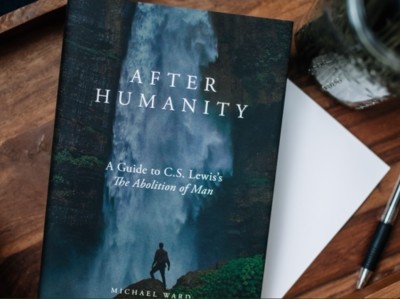Q&A: Scholar dissects one of CS Lewis's hardest books, 'The Abolition of Man'

Dr. Michael Ward reflected on one of C.S. Lewis’s most widely admired but least accessible works in an interview with The Christian Post. Ward’s newest book, After Humanity, guides readers through The Abolition of Man, which Lewis himself described as “almost my favourite among my books.” Ward’s commentary explains, clarifies, and contextualizes Lewis’s material to make it more accessible to a modern audience.
Recognized as one of the world’s foremost Lewis scholars, Dr. Ward is the author of the best-selling and award-winning Planet Narnia: The Seven Heavens in the Imagination of C.S. Lewis (Oxford University Press), co-editor of The Cambridge Companion to C.S. Lewis (Cambridge University Press), and presenter of the BBC television documentary The Narnia Code.
The following is an edited transcript of The Christian Post’s interview with Michael Ward.
Stewart: The title of your book is After Humanity. How did you decide on this title?
Michael Ward: Three reasons. First, it reflects the “post-human” future that Lewis forecasts in The Abolition of Man. Second, I’m nodding to Alasdair MacIntyre’s great work, After Virtue, one of the most influential philosophical works of the last 40 years. After Virtue is, I argue, very similar, perhaps even indebted to, The Abolition of Man. And the third reason is that, although it’s not a work of Christian apologetics, Abolition does look in a Christian direction at various times, not least by citing a verse from John’s Gospel as the final quotation in the Appendix. By ending his book on this note, Lewis is suggesting that it’s to Jesus Christ that people should look if they’re really seeking “after humanity.”
Stewart: What made this your next major scholarly work after Planet Narnia? Is there a connection between the two?
Ward: I was asked to write a foreword to an edition of The Abolition of Man, which never actually saw the light of day. But that foreword grew and expanded, and by various twists and turns it became a major scholarly undertaking, until it morphed into After Humanity.
As for the connections between The Abolition of Man and Planet Narnia, there are many, but let me mention just two. One is that, in The Abolition of Man, Lewis talks about the human person in three parts: the head, the chest, and the belly. The chest is the liaison officer between rational man (the head) and visceral man (the belly). It’s in the chest that passions should be stabilized and sentiments civilized. The chest, being the location of “Practical Reason,” is what makes us human. And that’s why, in Narnia, Peter Pevensie grows up to be a “deep-chested man,” whereas Shift the ape, the villain of The Last Battle, has a weak chest.
Second, Narnia itself is something of a chest-like region. To the south of Narnia is the baking desert and the hot country of Calormen, where the inhabitants are sensual and cruel. But to the north of Narnia, the land becomes cold and stony: a succession of witches come from there, who do evil not through excess of passion, but through spiritual wickedness. So Narnia itself mediates between these two extremes—the sensual and the spiritual—and is therefore a geographical instantiation of the chest-like region. Of course, it’s all very subtle, and you only pick up on this if you know The Pilgrim’s Regress, where Lewis uses this north-and-south imagery much more explicitly in an avowed allegory.
Stewart: It’s been said that Abolition has even more relevance now than when it was originally presented. How would you say Lewis presciently addresses our current cultural climate?
Ward: He’s arguing that moral law is a premise; it’s not a conclusion. We have to accept it as a given; we can’t argue to it, we must argue from it. It’s an objective reality which we didn’t make up: we must submit to it, we must surrender to it and grow up within it. It’s like a trellis with which you would train a climbing rose.
But if you take the opposite view, that we create moral law according to our own subjective preferences, you can do whatever you like—because there’s nothing that is objectively real in the moral world. No, it’s just whatever you happen to choose.
Happiness consists in conforming oneself to reality, not twisting reality to suit your own convenience, or your own desires. The common modern-day phrase “speaking my truth” connects very precisely with this prophecy that Lewis is making—that we’ll all just determine reality according to our own particular perspective, which leads to moral anarchy and therefore to a “post-truth” world.
Stewart: In several places, your book mentions scientism. How would Lewis, in Abolition or otherwise, speak to that belief?
Ward: In Abolition Lewis remarks, “Nothing I can say will prevent some people from describing this lecture as an attack on science.” Of course, he’s not attacking science but scientism, which is the reduction of all forms of knowledge to the scientific form of knowledge, where “scientific” means valueless quantification. Scientism is a corruption of science, whereas science properly understood is a noble undertaking. Many great scientists have been (and are) Christians.
Lewis is arguing that the “fact-value” distinction that characterizes scientism is a false dichotomy; he’s pointing out that the material world examined by the methods of inductive empiricism has a qualitative reality. “Nature” is not just so much raw matter to be chopped up and moved about to suit our own convenience: rather it has its own integrity that is in a relationship with the integrity of our human nature.
Stewart: The subtitle of Abolition of Man is “Reflections on education with special reference to the teaching of English in the upper forms of schools.” Does that mean Abolition is a book chiefly about education and aimed at educators?
Ward:Abolition certainly has a lot to say about the importance of education and, in particular, moral formation of the young. But that long and wordy subtitle of the book is, I think, a sort of joke, designed to off-set the alarming title. Lewis is not chiefly concerned with “the teaching of English,” still less with the teaching of English “in the upper forms of schools.” His main focus is the objectivity of value and the poison of subjectivism. He’s defending the one and attacking the other. Questions of classroom pedagogy aren’t his real target. His argument is much broader and deeper than that.
Stewart: With Abolition of Man being a strictly philosophical work, what about After Humanity should interest Christians who aren’t normally interested in philosophy?
Ward: Well, Christians are hopefully interested in engaging with their non-Christian neighbors. And one of the things Lewis is providing us in the pages of Abolition is just such an engagement. You can’t be a Christian human being until you’re a human being first. And recognition of objective value is what makes us human: this moral ecology that we all participate in. From a Christian point of view, you would want to argue, like Saint Paul does in the letter to the Romans, that this recognition of objective value is a manifestation of the image of God in man; this is the conscience speaking to us. But you don’t have to argue it theologically; you can argue it from another point of view, which is purely philosophical and anthropological.
That kind of common ground between theology and philosophy is one of the main things that Christians should take away from The Abolition of Man. And it’s one of the things I tried to bring out in After Humanity.
Stewart: How would you compare Lewis the philosopher to Lewis the theologian? Is the one harder to understand than the other?
Ward: I think it would be true to say that Lewis the philosopher is harder to understand than Lewis the theologian. It’s important to bear in mind that Lewis studied and taught philosophy at Oxford, but he never studied or taught theology at Oxford. From an academic point of view, Lewis was more serious as a philosopher than he was as a theologian. That’s perhaps why The Abolition of Man is as difficult as it is, which is why it needs this guide that I’ve written!
When Lewis is operating as a theologian, he’s operating as a well-read Christian who understands spiritual and religious issues and who desires to explain the faith to enquirers and sceptics. So when he’s in theological mode in other books, he’s naturally operating at a more general, popular level—not at the high, academic level he operates at when he’s in philosophical mode.
Having said that, I should add that, even as a philosopher, Lewis could sometimes operate at a more populist level. Indeed, the first four chapters of Mere Christianity are, you might say, a popularization of The Abolition of Man. So, not all his philosophy is difficult or inaccessible. But Abolition is certainly one of his harder works.
Stewart: How might Abolition have been better—or worse—if Lewis had argued for a theistic or a Christian basis for morality?
Ward: Speaking as a Christian myself, it would have been better because it would have gone deeper; it would have taken steps beyond philosophy into theology. As Lewis himself remarks in another place, “morality, apart from religion, cannot explain its own claims clearly. (Try any philosophical system of ethics.)”
But if Lewis had gone all the way into theology, Abolition would have been worse because it would have left behind all those readers who aren’t theists and Christians, but who nonetheless want some kind of philosophical justification for objective value. One doesn’t need to present the whole of the gospel on every single occasion. You can narrow things down and just take a baby step as it were, just get as far as this anthropological position, arguing for recognition of objective value as the definitively human faculty. That’s a good thing to do; that’s worth nailing down. It’s not the whole picture, it doesn’t clarify things as much as a fully-orbed Christian apologetic would do— but it’s still a worthwhile undertaking. We mustn’t make the best the enemy of the good.
Stewart: You’ve done a lot of original research for After Humanity. What are some of the new things you’ve been particularly excited to unearth?
Ward: Some of the most fun things have found their way into the photo gallery. One of them is the original “blurb” that Lewis wrote for Abolition and which has never been published before. Another is a photograph of the teenage Lewis in uniform as an officer cadet in the British army, alongside his friend Paddy Moore—who, alas, died in the Great War. I put this photograph in After Humanity because one of the arguments that Lewis makes in Abolition is that as soon as we actually have to suffer in order to live up to a moral truth, we’re not just choosing things that suit us. Sometimes doing the right thing is really hard—might even cause us our death. And this shows us its objectivity. So I think we would do well to remember the moral authority that Lewis speaks with in The Abolition of Man, because as a young man he not only had lost a close friend, but he himself had very nearly been killed in service of his country. And yet, it hadn’t shaken his belief in the objective value of self-sacrifice.
There are various other fun things in the photo gallery, but I’ll leave readers to discover those themselves.
After Humanity is now available from Word on Fire Academic.
Cap Stewart is the author of the curriculum Personal Purity Isn’t Enough: The Long-Forgotten Secret to Making Scriptural Entertainment Choices. As a cultural commentator, he has contributed to Cultural Engagement: A Crash Course in Contemporary Issues (Zondervan Academic, 2019), among other print and online publications. He has been blogging at capstewart.com since 2006.



























